Peter MALONE
Saturday, 18 September 2021 19:30
Hanky Panky
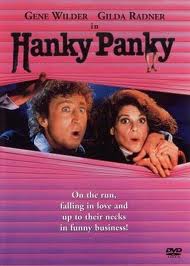
HANKY PANKY
US, 1982, 107 minutes, Colour.
Gene Wilder, Gilda Radner, Richard Widmark, Kathleen Quinlan.
Directed by Sidney Poitier.
Hanky Panky is a rather raucous comedy-thriller starring Gene Wilder - at his most strident. He has appeared in many excellent comedies, especially for Mel Brooks. He has written and directed himself in The Adventures of Sherlock Holmes' Smarter Brother and The World's Greatest Lover. He is a genuinely funny comedian - but relies too much on excess here. He is paired with Saturday Night Live American television star Gilda Radner - who plays her role fairly straight. Kathleen Quinlan, Robert Prosky and Richard Widmark are very good in the main supporting roles.
The film is directed by Sidney Poitier - who directed the lively comedies Uptown Saturday Night, Let's Do It Again and, the socially conscious comedy in the Frank Capra style, A Piece of the Action. Here he has a tribute to as well as parody of the fleeing Hitchcock couple - in such films as North By North West. There are many Hitchcock parallels although the film is not particularly subtle. It has been remarked that it is Hitchcock filtered through Close Encounters of the Third Kind. While entertaining in many ways, something of a disappointment.
1. An amusing comedy? Content, style, stars? The parallels with the Hitchcock thriller? The mystery, the fleeing couple, the pursuit - the Grand Canyon flight? The confrontation in the realms of American espionage? The range of Hitchcock parallels and the details of the screenplay?
2. The film as a vehicle for Gene Wilder and G11da Radner? Their appeal, to American audiences. to the universal audience? The ordinary, little American man and his outwitting the powers? The strong but supportive work-in? An attractive couple?
3. The background of American military secrets, espionage and the range of Hitchcock films on espionage? Innocents drawn into nuclear plots. American espionage? Chases, torture, patriotism? The set comedy pieces, the set action pieces? The film drawing on the humour of the spy thriller?
4. Colour photography, the use of New York and the city locations, Boston? Arizona and the Grand Canyon? The flavour of American cities? Scenic values? The crises equivalents of Hitchcock thrillers: Saboteur, The Thirty- Nine Steps, North By North West?
5. The intriguing introduction with the painting and the suicide? The visit of Janet to see Calder and the attack on Calder, Janet's fleeing, the taxi and the parcel, her own death? Desperate moods, deaths and mystery?
6. Richard Widmark as Ransome and his skill in staring villainy? Severity, his black and white henchmen, following Michael Jordon, the interrogation, the truth drug, the pursuit of Janet and his murdering her? Ransome appearing in Boston. the chase in the mall? Ransome as a villain, in Arizona, the kidnapping? The confrontation? The significance of the black and white henchmen and their continually chasing Jordan? Villainous types - how well presented?
7. Michael Jordan as hero: Gene Wilder's appearance and presence. clowning and shouting, his happiness in New York and his contract, the pass at Janet, sharing the taxi, the parcel. posting it, the capture, the torture, the escaping - and the pinching of the lady on the escalator, finding Janet, being present at her death, taking the gun, the reaction of the hotel patrons, his being filmed for television, his being chased and watched? His disguises? The comic style and its frenetic and hysteric shouting? Quips, wits, frantic survivor?
8. His trying to cope and use his wits, the encounter with Kate, the farcical escapes, disguised as a woman, as the visit to the nightclub and the encounter with the magic man, the car chase, the mall chase in Boston, the background of the parcel and the post, the computer checkout of the tape and his switching the tapes, the painting and his interpretation of it, the going to Arizona, his using his wits in saving the tape, the pursuit by the spies, the plane ride through the Grand Canyon and its hysteric desperation, the capture of Kate, his capture and seeming to capitulate, the circle of fire and his vindication? The serious side of his character, humorous side - the picture of the hero of American films?
9. The portrait of Kate - presence, newspaper story, helping Michael escape, the truth about her brother, Boston, the chases, the interpretation of the painting, sharing his experiences in the plane, the kidnap, the rescue and the grand finale? The straight playing of this American comedienne?
10. The supporting cast and their contributions - Janet and her desperation. Calder and his attack in the club. his recovery. his control, using Jordan, trying to seek out the traitor? Pruitt and his control, the traitor, contact with Ransome?
11. The comedy sequences in New York and urban comedy contrasted with the espionage and open spaces of the West for the finale? The special effects for the flight, the final explosions?
12. The background of American defence, computer plans, nuclear warfare? The innocent bystander caught up - an image of nuclear dangers of the '80s? Serious contemporary themes communicated via comedy?
Published in Movie Reviews
Published in
Movie Reviews
Tagged under
Saturday, 18 September 2021 19:30
Hambone and Hillie
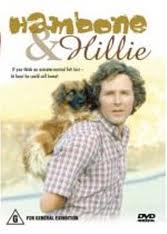
HAMBONE AND HILLIE
US, 1984, 97 minutes, Colour.
Lilian Gish, Timothy Bottoms, Candy Clark, O.J.Simpson, Alan Hale Jr, Robert Walker Jr.
Directed by Roy Watts.
Hambone and Hillie is a dog story for family audiences. It is a tale of America, the lost dog making his way across the continent and reaching home. It is the kind of dog film that warms the hearts of family audiences.
For adults there is the interest of seeing Lilian Gish as the human star - supported by momentary cameos of a great range of performers like O. J. Simpson, Timothy Bottoms, Candy Clark, Robert Walker Jr.
Children will probably enjoy the film - but it is particularly American.
1. An entertaining dog story? For family audiences?
2. The film as a piece of Americana, the dog crossing the country the cities and the landscapes of the United States? The cross section of people, good and bad?
3. The use of locations, atmosphere? The dog's life? The cross-cutting to Hillie and the human response to the lost dog? The musical score - with a touch of patriotism?
4. Audiences identifying with Hillie? The loss of the dog? Her concern? The old lady? The audience identifying with the people met along the way? With the dog and its adventures?
5. Pets and the bonds between pets and humans?
6. The opening situation, Grandma, the plane, the chase at the airport, Hambone lost, Hillie and her search?
7. Lilian Gish as Hillie, the family, love, searching for the dog, wanting to move - and the happy ending and staying put? The sketch of the family?
8. The adventures of Hambone across the United States: the black truck driver, the dog-catchers, the children and their pets, the other dogs, the pregnant wife of the policeman and the crooks, Las Vegas, the tramp and wandering the roads, the Indians in New Mexico and their helping? Food, survival?
9. Hambone and Hillie and the happy reunion?
Published in Movie Reviews
Published in
Movie Reviews
Tagged under
Saturday, 18 September 2021 19:30
Hannie Caulder
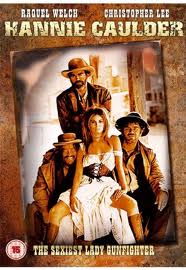
HANNIE CAULDER
US, 1971, 85 minutes, Colour.
Raquel Welch, Robert Culp, Ernest Borgnine, Strother Martin, Jack Elam, Christopher Lee, Diana Dors.
Directed by Burt Kennedy.
Hannie Caulder: Burt Kennedy specialises in Westerns, both serious adventures and parodies. In the late 60s his films became slighter. This one is a blend of grim revenge and skit on stock villains, hero and heroine, the first lady gunfighter, Raquel Welch. Actually story and theme are old but made plausible enough and Raquel herself acts better than usual, very much subdued, so more credible. Ernest Borgnine and Co are scruffy, callous villains whom we laugh at as well as loathe. Robert Culp is a bespectacled bounty hunter and, since the film is British, shot in Spain. Christopher Lee and Diana Dors feature. Bloodthirsty, but not a bad Western.
1. Was this an enjoyable Western?
2. Was it a 'typical' revenge Western? Why?
3. What made the film different from other Westerns or was it basically indistinguishable from many others?
4. Was Hannie Caulder a credible character. heroine? Did Raquel Welch make her convincing? Were too many concessions made to Raquel Welch's "sex-symbol" status and to audience expectation (especially the blanket) or did the film make her stand on her own merits?
5. How repulsive were the Clemens brothers? Were they too repulsive? Were they typical of the West - robbing, bungling, murdering and raping, quarrelling?
6. The terms of justice. who had the right to administer the law on the Clemens brothers for Jin Caulder's death? Did Hannie? Did the bounty hunters? (What rights did the bounty hunters have for their work?)
7. Was Price a sympathetic character? Why? Why could he not dissuade Hannie from her revenge? Why did he teach her to shoot?
8. The Bailey interlude - what did this add to the film? The character of Bailey and his household. some peace and normality. his skill at gunsmith work. Hannie's growing shooting ability? The purpose of the bandit attack - to pad out the film or did it add to the film?
9. Did you expect Price to be killed? How did that alter the tone of the film? In sympathy for Hannie's quest, in dislike of the Clemens brothers?
10. Were their deaths handled well in the film - were they too vengeful?
11. Hannie was wounded - did that keep her down to human size. instead of being superwoman?
12. The film also used some parody. Did this blend well with the revenge-style western? Was this a good Western?
Published in Movie Reviews
Published in
Movie Reviews
Tagged under
Saturday, 18 September 2021 19:30
Hair
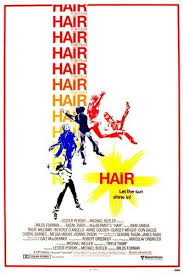
HAIR
US, 1979, 121 minutes, Colour.
John Savage, Treat Williams, Beverly D'Angelo, Annie Golden, Dorsey Wright, Cheryl Barnes, Richard Bright, Nicholas Ray.
Directed by Milos Forman.
Hair is exuberant protest viewed in the light of experience - a reminder of what the 'sixties were like and an affirmation of so many of the issues. However, the late 'seventies U.S. Vietnam-consciousness is to the fore (with an ending strongly parallel to Deer Hunter, highlighted by John Savage's presence). The means stronger impact for Americans than for ourselves. The film is beautifully and inventively photographed; songs, familiar and unfamiliar, convey moods and points (the daring of mouthing words and sentiments in the Lenny Bruce vein so much more commonplace now). A colourful variation on American nostalgia and conscience examination (directed by Czech ex-patriot Milos Forman, Taking Off, Cuckoo's Nest).
1. An attractive and enjoyable film? Why an American success in 1979? Less successful for non-American audiences? Its atmosphere, style? Issues? The contrast of American outlook in '69 and '79? The original in the midst of protest of the late '60s and an uncertain future? 1979 and the wisdom of retrospection?
2. The film's attitudes towards the '60s? Benign, humour, nostalgia? The affirmation of the basic issues of protest, the reflection on freedom and the protest for freedom, memories of the Flower People? The attitude towards wealth,, snobbery? The retrospect on drugs? The retrospect on Vietnam?
3. The American origins of the stage play, the film? The Czech director and his insight into the American situation?
4. The impact of the music, the lyrics? The lasting value of the music? The consideration of the songs: 'Aquarius', 'Coloured Spade', 'Ain't Got No', 'Black Boys', 'White Boys', 'Electric Blues', 'Old Fashioned Melody', 'Flesh Departures', '3-5-0-0', 'Somebody to Hold', 'Sodomy', 'Donna', 'Hashish', 'Manchester', 'Abie Baby', 'Fourscore', 'I'm Black', 'Air', 'Party Music', 'My Conviction', 'I Got Life', 'Hair', 'L.B.J.1, 'Hare Krishna', 'Where Do I Go?', 'Walking In Space', 'Easy to be Hard', 'Good Morning Star shine', 'What a Piece of Work is Man',, 'Somebody to Love', 'Don't Put It Down', 'Let the Sunshine In'?
5. The use of the songs, their insertion into the screenplay, their illustration of character, of plot, theme? The various singers who presented the songs? The ensemble? The mood of the songs, especially of the '60s? Their social and personal comment? America in the '60s? Comment on the visual styles of the choreography -especially the opening in Central Park for 'Aquarius', Claude's imaginary wedding and the church sequence? The various tableaux e.g. with the army training? The moving style of the camera?
6. The opening in Oklahoma and the reference to social films in the American tradition, the Mid-West? and the average American? The echoes of the old style American and cowboy and the contrast with the '60s? The changing of the American type? The introduction to Claude, his Polish background, the farm, horses,, the farewell to his father, the money, the bus ride and the journeying through America? The overtones of Midnight Cowboy moving towards New York? The various landscapes, the world opening up to Claude? Indication that change was to come? The experience of the average American, the judgments that he brought to the situation, the change of feeling? Claude as the 'every American?
7. The introduction to Berger and company? 'Aquarius', their place in Central Park, their freedom, clothes, hair? (The irony of the later meeting with Berger's parents, the conventional background, Lafayette's child and his girlfriend etc.)? Jeanie and her baby? The world of the dropout, the gentle flower people? A memory of a real past, fantasy? The nature of freedom? Their begging from Claude and his reaction, the hiring of the horse, the ride, urging Claude on to chase the horsewomen? Their advice for Claude's seeing New York, their introducing him to drugs? The bench sequence and the night passing and the hallucinatory nature of drugs?
8. The contrast of Sheila and her girlfriends on the horses? The presentation of American wealth and the attack on it? Claude and his showing off his riding ability? His fascination with Sheila? The irony of Berger urinating and discovering their address? The gatecrashing of the party, the contrast of the clothes, the slinging and slanging matches with the guests, Sheila's boyfriend and his weak acceptance of them? The build-up to the clash and Berger's singing 'I Got Life'? The dance on the table, the fat lady in pink and her sharing in it? Sheila's parents and their reaction? Sheila as another symbol of young America? The importance of her trying the drugs with her girlfriends before the party? Her fascination with Berger and his freedom? Her liking for Claude? Her daring, experience, change?
9. The arrest and its repercussions, Claude and the party in jail and the need to get out? Berger's deal with the money? The challenge to Sheila and her boyfriend, taking the car? The irony of Berger and the encounter with his parents? His nonchalant father, the dominant mother and her giving him the money? Their freedom? The importance of the swim in the park, the taking of the clothes, Sheila going home in the taxi? Their later seeking Sheila out and inviting her to Nevada?
10. Berger and his vitality, what he represented, the drug scene, the flower people, his enjoyment of life, his being at home, his goals, his generosity in going to Nevada to see Claude?
11. Jeanie and her love for the various members of the group, her vitality and kindness? Woof, Lafayette? How well did the group work together? As illustrated in the songs?
12. The transition to Nevada, Claude's decision definitely to go, the mocking of the army? The hair sequence and the humour of the symbol of hair? The changing seriousness with the Nevada sequences? The training? Songs? The American involvement in the war and the comment via songs? Claude at the camp, Berger and his devices, Sheila and her getting the uniform, the substitution of Berger, the backfiring of the joke and the lyricism of the picnic, the seriousness of Berger's death? The film's comment on the war?
13. Claude as representing the volunteers going to Vietnam? Surviving? The memories of the '60s and the effect in the '70s?
14. The humour of the recruitment, the examination, the nudity and white boys and black boys and the mocking of the board?
15. The hard training - anti-war, pro-war, the effectiveness of the collage?
16. The reality of Vietnam with the troops moving out, Berger going to war and the song? The final tribute at the graveside?
17. The theme of the American city and its way of life contrasting with the countryside and its way of life? The road, Nevada?
18. The contrast of groups in society, wealth differences etc? The critique?
19. The presuppositions of the film about the freedom and the liberation of the dropouts of the time? How was this recapitulated in the final song and the many groups in Central Park? What did the film end with?
20. The film as made in the '70s, the wisdom of hindsight?
Published in Movie Reviews
Published in
Movie Reviews
Tagged under
Saturday, 18 September 2021 19:30
Hobo's Christmas, A
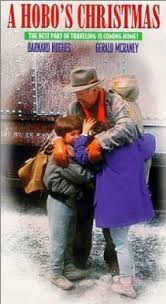
A HOBO'S CHRISTMAS
US, 1987, 94 minutes, Colour.
Barnard Hughes, William Hickey, Gerald Mc Raney, Wendy Crewson.
Directed by Will Mackenzie.
A Hobo's Christmas is one of the many American telemovies with the Christmas theme. The focus is on family - but this time the relationship between a middle-aged son and his estranged father. The father, who walked out on the family twenty five years earlier, has been moving around the country and finally decides to see his son and his grandchildren. The setting is Utah. The film has the atmosphere of Christmas, the delight of the young children in finding their grandfather. There is strong tension between father and son. Complications arise because of the widower son wanting to marry a nurse at the local hospital who is to be reappointed to San Francisco. The film has an enjoyable atmosphere, has strength from the performance of Barnard Hughes as the crusty but mellowing old grandfather. Gerald Mc Raney is the son. The film was directed by Will Mackenzie (Worth Winning). Genial entertainment for the family - with a message.
1. Popular family telemovie? Family themes? Christmas?
2. The atmosphere of family, work, employment, breaks, unhappy memories, reconciliation?
3. The Utah settings, winter and Christmas? The musical score and songs?
4. The title, the focus and expectations?
5. Chance Grovner, the men on the train, travelling as a hobo? His friends? Harry and his pessimism? The discussions about the years, the twenty five years. the postcards sent to the family? Chance and his ageing, wanting a reconciliation?
6. Charlie, his relationship with his children, love for Laura and the prospect of re-marriage? Being out of work, at the police station? The background of the closing down of steel mills? Christmas day, his having to work? Going to the hospital, being Santa Clause? The background of his clash with his father, yet keeping his postcards? The memory of his mother? His father's arrival, the police station, the hospital? Hostile to him? Laura and her interventions? The change of heart and his motives?
7. His decision to send his father away, the discussions with Laura, the children? Chasing him, meeting him as the railroad, Harry? Taking him home? Chance and his relationship with the children? Talking to them, playing with them? The breakfast scenes, the reminiscences and the stories for the children? For Charlie? The blend of the happy and the sad? The question about jobs and employment, pride? Chance's story, his being out of work, his relationship with his wife, financial support but the absence of emotional support?
8. The children, their learning, their love for their grandfather? The question of the tree - and his buying only the best? The presents? Planning with Harry for the cooking of the meal? Getting the group to come tithe house? The happy re-union, the meal, the presents? The children and their relationship to Laura, questions of the future?
9. The celebration of Christmas day, Charlie at work, the return home, the gifts, the dinner, the neighbours, the hobos? Hopes? The gift of the piano? Chance and his carpentry? His gift?
10. Laura, her job and her ability, the hospital, love for Charlie, wanting to help him? The break with him? Listening to the story of Karen and her death?
11. Chance, his not wanting to stay, the emotional bond and the reconciliation with Charlie? With the children? His wanting to leave quietly? Their pursuit of him to the railroad, the dilemma, Harry urging him to continue on the road? The reasons for his decision?
12. The hobos, the hobos life, the codes, work, possessions? The grandfather explaining the life of the hobo and the bonds with the group? The work, the money, the support? His age - and giving it up for love?
13. A Christmas story and the longing for family love and reconciliation?
Published in Movie Reviews
Published in
Movie Reviews
Tagged under
Saturday, 18 September 2021 19:30
Hail the Conquering Hero
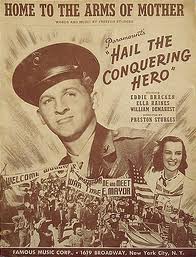
HAIL THE CONQUERING HERO
US, 1944, 101 minutes, Black and White.
Eddie Bracken, William Demarest, Ella Raines, Franklin Pangborn, Elizabeth Patterson.
Directed by Preston Sturges.
Hail the Conquering Hero is considered a classic comedy by writer-director Preston Sturges. It can be linked with its contemporary The Miracle of Morgan's Creek. Sturges had a sardonic wit and was able to uncover some of the hypocrisies of American society. This film has a war setting and so elements of sentiment and patriotism come through the satire. Eddie Bracken and William Demarest lead a strong cast, many of whom appeared regularly in Sturges' films. An example of black comedy which would be taken for granted in later decades.
1. Entertainment classic? War comedy? American satire - on human nature and Americana? An early black comedy?
2. Preston Sturges' work as writer and director? Sardonic writing, dialogue? Sentiment and black humour? Exposing American hypocrisies? A mirror to American society?
3. Production values: black and white photography? The war period? Pace, score and songs?
4. The title and its American patriotic tone? Its ironic fulfilment? Sentimental and hopeful fulfilment at the end? Americans searching for heroes during the war? Expectations of heroics? The credits, music and use? The patriotism and satire - the writer-director having it both ways?
5. The introduction to Woodrow: sadness, wanting to be in the Marines, drinking, the recitation of his history? A nice average American - with hay fever? The comedy of the little man victimised? His being swirled into the pretence? Panic? Cover-up? His being nice to Libby? His father and his expectations? The pressure on the little man to perform? To pretend to be the hero?
6. The Sergeant and his assistant and their listening to the story? The sequence in the New York bar? The phone call home? The exerting of pressures -all with good intentions? The American quick talk? Train ride, medals? Their continued support throughout the charade? Their help in covering up? The growing enthusiasm? The glory of the Marines - in serio-comic tones and music?
7. Woodrow and the train, his fears, reaction? Wanting to tell the truth? Not telling the truth? His mother? Libby? The reception, the statue? The church? The gifts? The Mayor and his speeches? The pressure growing to nightmare? His telling the truth to Libby? The final exposure and the relief? His wanting to leave quietly and honourably? The whirl for Woodrow and the tones of comic pathos?
8. The town and its frenzy? The Mayor and his speeches, the bands, the welcoming committee? The satire with the townspeople and their dithering, speeches, pressures? The group against the Mayor seeing Woodrow as their political hope? The petition and the campaign?
9. The Mayor and his speech, rehearsing? The pressures on his son and the engagement to Libby? His pomposity, exposure and fainting? The satire on American authority figures? The contrast with the earnestness of his opponents?
10. Libby as attractive heroine? Woodrow letting her go, her fiance, relationship with the Mayor? Her hearing the truth, not exposing him? The happy ending? The character sketch of her fiance? His relationship with his father?
11. The portrait of American motherhood - moms, devoted to their sons?
12. The fickleness of the mob? The acclaim at the station? The belief in Woodrow's integrity? Turning against him at the station? And then turning for him? Their motives for supporting him?
13. Themes of human nature? Strengths, weaknesses? Hypocrisies? The true nature of heroism and integrity? Seen in the light of war and politics?
14. The status of the film as an American comic classic.
Published in Movie Reviews
Published in
Movie Reviews
Tagged under
Saturday, 18 September 2021 19:30
House of the Long Shadows

THE HOUSE OF THE LONG SHADOWS
UK, 1983, 101 minutes, Colour.
Vincent Price, Christopher Lee, Peter Cushing, Desi Arnaz Jr, John Carradine, Richard Todd.
Directed by Pete Walker.
The House of the Long Shadows is the sixth version of George M. Cohen's horror spoof, Seven Keys to Baldpate. It was adapted for the screen and directed by Pete Walker, veteran of small budget British horror films including House of Whipcord, House of Moral Sin. While Desi Arnez Jnr is the lead, the film offers the opportunity for veterans of horror films to do their thing: Christopher Lee, Peter Cushing, Vincent Price, John Carradine. It is a pleasure to the veterans performing, remembering their styles even in parody, and the film highlights the artificiality by its being a contrived drama to frighten the would-be novelist. Richard Todd appears also in a supporting role. For nostalgia, for horror fans.
1. The popularity of the horror film? Its genre, conventions? The significance of the cast, audience expectations from them?
2. Seven Keys to Baldpate, a popular horror spoof? Updated to the 80s?
3. The atmosphere of the 80s, London, Wales, the house itself? The gothic atmosphere of the house? Musical Score?
4. Kenneth and his brashness, the American novelist, popular in style, interested in money? The friendship with Sam, the discussion of the books and the publicity? The chance encounter with Mary? The bet?
5. Kenneth and his drive to Wales, meeting Mary at the station, the young couple? The station master? Eeriness, darkness, Kenneth lost? His arrival at the house, the darkness? His beginning to write and his experience?
6. The emergence of the housekeepers, their tone, sinister? Plausible presence? The keys? Mary's arrival, her melodramatics, plea, conspiracies? The final revelation of the truth?
7. The brother arriving, his being allowed in? The reasons given for his passing by? His drinking? The second brother arriving, from the U.S.? The reunion?
8. The story of the family, its sinister overtones, Roderick and the rape, his being locked in the house? The noises in the house, the brain? The meal?
9. Corrigan's arrival, his style, wanting to buy the house? Wanting to leave, the slashed tyres?
10. The young couple, their sudden arrival, their bickering? Their deaths?
11. The passages in the house, the effect on Kenneth, on Mary? the growing number of corpses? The deaths of the brothers, the housekeepers? Corrigan revealed as Roderick? The horror, the shadows?
12. The irony of the group all being actors? The action in retrospect? The irony of them all being part of Kenneth's manuscript?
13. His return to London, Sam, the winning of the bet? The irony of seeing Mary as Sam's secretary? The Vincent Price character as a waiter in the restaurant?
14. The film as an exercise in the horror genre? The performance of the stars and capitalising on their screen personae?
Published in Movie Reviews
Published in
Movie Reviews
Tagged under
Saturday, 18 September 2021 19:30
He Said, She Said

HE SAID, SHE SAID
US, 1991, 115 minutes, Colour.
Kevin Bacon, Elizabeth Perkins, Sharon Stone, Nathan Lane, Anthony La Paglia.
Directed by Ken Kwapis and Marisa Silver.
He Said, She Said is a light romantic comedy. It is a throwback in many ways to the partnerships of the 30s and the 40s in the screwball comedies, the matching of Rosalind Russell with various actors, Spencer Tracey and Katherine Hepburn - with a touch of Rock Hudson and Doris Day.
There are two parts of the film each directed by a different director, Ken Kwapis directing He Said, and his wife Marissa Silver, directing She Said. There doesn't seem to be a great deal of difference in the cinematic styles; the difference is in the screenplay in what he sees and what she sees, in what he remembers and in what she remembers, in what he forgets and in what she forgets.
Kevin Bacon and Elizabeth Perkins are personable as the young couple. They are rival columnists on a paper, he with right wing stances, she with left wing stances. In their encounter and rivalry with each other, they fall in love and live together. They audition for television and go on a programme with their clashing views, He Said, She Said. All ultimately comes to head and there is a scene on television (capitalised on by the media and promotions) and, of course, a confession and reconciliation. The film is presented with the light touch but with serious themes. The supporting cast includes Sharon Stone as Bacon's former girlfriend and Anthony Paglia as the floor manager at the television station.
1. Entertaining light romantic comedy? Battle of the sexes? Female perspectives, male perspectives?
2. Baltimore, the city locations, the newspaper offices, the television studios apartments, restaurants and cafe, the streets? Authentic? Musical score and range of songs?
3. The title and its ironies, the battle of the sexes? The television programme? The two parts of the film and the different perspectives?
4. Audience identifying with him or with her? Stances in the battle of the sexes? The rivalry in the media, in opportunities, career possibilities? prejudices? Relationships?
5. Audience response to the differences in perspective of the same events?
6. Her failure and the many takes? Its success? The build-up, Dan and his friendship with Linda (which he omitted in his memory)? The meal together - and her imagination with the pornographic touches? Her reliance on her girlfriend and getting advice? Her throwing the mug?
10. The differences in what each remembered, and which each omitted? who was telling the truth? The truth from different perspectives?
11. Mark, his work on the television floor, his help? Laurie relying on him, driving away from the studio after her walking out? His having to sit at the cafe during the fight?
12. Linda, her relationship with Dan in the past, going out for a meal - transformed in Laurie's imagination? Turning up again, sitting at the cafe with Dan, the clash with Laurie?
13. The television station, the manager, his fears, the phone call from the boss, deferential? His hopes and ambitions? His auditioning the two, promoting them? The boss and his phone call, wanting to take on the program? His arrival and watching the performance?
14. The public and their response to He Said and She Said? People in the restaurant, in the shop wanting the photo for promotion? The advertisements on the buses? The promo material for the clash for the next day?
15 . The aftermath of the programme, the binding contract? The final night - Laurie letting Dan in, his sleeping on the couch? Each recording their separate pieces and each apologising changing the point of view? The beginning and the end with the discussion about the freeways - as an image of what was happening to them in their independence and their commitment. Their apologies to one another, the
previous discussions about living together, marriage, commitment, love?
16. The romantic and happy ending? satisfying?
Published in Movie Reviews
Published in
Movie Reviews
Tagged under
Saturday, 18 September 2021 19:30
Heart Condition

HEART CONDITION
US, 1990, 95 minutes, Colour.
Bob Hoskins, Denzel Washington, Chloe Webb.
Directed by James W. Parriot.
Heart Condition is a lightly amusing comedy, a variation on the changed identity genre. Bob Hoskins is a loud mouthed racist Los Angeles cop who has a heart attack. His heart replacement comes from his arch enemy, a suave black lawyer, played by Denzel Washington, who is murdered by gangsters. As Hoskins goes on his rounds again, Washington appears to him and together they track down and solve his murder.
The film has a number of comic touches - and variations on the invisible man jokes. It also means that Hoskins becomes aware of his racism. The supporting cast includes Chloe Webb (Nancy from Sid and Nancy).
1. Entertaining comedy, change of identity, ghost story, police investigation, variation on the Defiant Ones with the black and white man together (with a heart instead of chains)?
2. The world of Los Angeles, the sleazy world of prostitution political corruption? Police, gangsters - in the ordinary Los Angeles world?
3. The title the emphasis on Jack Mooney and his heart condition, the heart transplant - and a change of heart (literally and emotionally)?
4. Bob Hoskins' style as Jack Mooney, his following Stone, his clash with him, the car chase, wanting vengeance? His personal life style, a slob, eating? His home? Crystal and the past association, in love with her? His behaviour, the clash with his superiors, suspension? His cat and his home life? The heart seizure, the experience of the attack, the operation, the aftermath - and the visit from fellow police? 5. Stone as a suave and wealthy lawyer, slick manner, his relationship with Crystal and the girls, the dangers of the club, the car chase, drug deals, his murder, his heart available for transplant?
6. The prologue of the film with the girls, Crystal and her photography, the sexual behaviour, drugs, the death of the senator, the cover-up? The girls held, Stone releasing them, the police? The murders?
7. Mooney and Stone, the personal clashes, the race issue, the antagonism. Stone's appearing, Mooney's antics - and treading with a ghost? Reality and appearances? Working together, the investigation, Mooney persuaded by Stone?
8. The detective work, the leads, phone calls, the importance of sprucing Mooney up, the visit to the shops? The transformed Mooney? The date with Crystal, the question of manners and doing the right thing, the night together, Crystal’s reaction? Memories of the past? Her puzzlement about his behaviour?
9. Crystal's world, the pressures, the girlfriend, the prostitution, the photos, giving Mooney the role of film, the development of it? Her appearing with the child -and the irony that it was Stone's? His amazed reaction?
10. Mooney and his contacts, the police? Following the gangsters, the checkouts, the build-up? The beach house? Chases, shoot-out? And Stone helping things along as a ghost?
11. Stone and his response to the child, the effect? Crystal and her life - and her relationship with Mooney?
12. The happy resolution, the shooting, the photograph, the wedding, the baby - and the end of racism? A good hearted police thriller?
Published in Movie Reviews
Published in
Movie Reviews
Tagged under
Saturday, 18 September 2021 19:30
Hypersapien: People From Another Planet
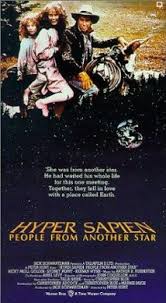
HYPER SAPIEN: PEOPLE FROM ANOTHER PLANET
US, 1986, 93 minutes, Colour.
Sydney Penney, Keenan Wynn, Gail Strickland, Talia Shire.
Directed by Peter Hunt.
Hyper Sapien: People From Another Planet is a close encounter of a very gentle, family kind. It was produced by actress Talia Shire who appears as a doctor, and directed by Peter Hunt (action films like On Her Majesty's Secret Service, Gold, Shout at the Devil).
Two young girls, aliens from another star, want to come to Earth to see what it is like when their own race decides that Earth is not ready for aliens. They arrive in Wyoming (echoes of Close Encounters) and encounter a teenage ranch boy and his politically minded family, as well as his grandfather, who has an affinity with the Indians. They learn something about being human, the alien uncle comes to find them and is attacked by a policeman who thinks he is a political assassin. Needless to say, everything is worked out about the aliens deciding not to reveal themselves to humans at the moment - but the heroine is able to stay on Earth with her newfound friend.
Really a kind of Saturday matinee alien film for the family audience.
1.The close encounters films of the '70s and '80s? This version for younger and family audiences?
2.The title and its meaning (how attractive or off-putting)? The people from other planets, close encounters with Earth people, the effect on both sides, final decisions?
3.The space special effects? The oddball creature that comes with the two girls? The spacecraft? The contrast with Wyoming ranch settings? The political background? Musical score?
4.Audience involvement with the premise that aliens could come from the moon, have a higher civilisation, are interested in making contact with humans, but underestimate their intelligence and emotions? The mission, the two girls deciding to come to Earth? Their finding themselves in Wyoming, their appearance, colour of their hair, clothes? The message to their uncle? Their wandering around Wyoming - with their television knowledge, wanting to find the mundane Earthly experiences?
5.The family, Dirt waking up, relationship with his family, going out to work? Finding the girls, the bike, learning about them, their knowledge of what he was thinking? Befriending them, taking them to his grandfather and the Indian friend? Getting food and clothes for them - and the suspicions of his sister? Helping them settle?
6.The effect of human experiences on the girls? Their relationship with each other, with dirt, with the grandfather, with the Indian woman? Talking different languages? Their decision to stay on Earth?
7.The political rally, the senator arriving, the uncle from outer space trying to find the girls, the policeman stalking him? The good time shattered by the bullet? The injury to the uncle?
8.Dirt helping with the escape? The girls going to the hospital? The uncle and his recovery, the puzzle of the police?
9.The spacecraft taking the girls away, Dirt being taken into the spacecraft and hearing the explanation of the mission? Being returned to Earth? With his grandfather? His willing Robyn to come back, her decision and her appearing? The happy ending?
10.The grandfather, friendly, relationship with the Indians, critical of his political son? His helping the alien girls?
11.A genial story about space, relationship with aliens, a look at the behaviour of human beings? The focus on Dirt as the hero - the ordinary young lad who can be called on to be generous and to help others?
Published in Movie Reviews
Published in
Movie Reviews
Tagged under